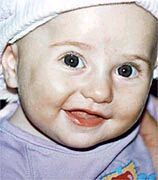Many headlines continue to present violence against Israelis differently from that against Palestinians.
On September 26, 2003, a Palestinian terrorist fired on a home killing 7-month-old Shaked Avraham and Eyal Yeberbaum (age 27) as they were celebrating the Jewish New Year. The terrorist continued to spray bullets until he was shot dead by an army reservist. Islamic Jihad claimed responsibility for the attack.
|
|
| Shaked Avraham, 7-months old, killed by a Palestinian terrorist |
A few months earlier (July 25), Mahmoud Qabha, a four-year-old Palestinian boy, was killed “when a machine gun atop an armored personnel carrier apparently fired accidentally, hitting the vehicle he was traveling in.” (Jerusalem Post, July 27, 2003)
In both instances a child tragically died. Yet, there were striking discrepancies in the way the newspaper headlines characterized the two tragedies.
* The September 27 headlines rarely indicated that an Israeli baby was murdered, while the July 26 headlines often specified that a Palestinian boy was killed. Many newspapers even included the age of the Palestinian boy. If a Palestinian child killed accidentally is included in the headlines, why is an Israeli child killed deliberately not mentioned?
* Following a pattern that CAMERA has documented in the past, the September 27 headlines about the terrorist attack mostly did not include reference to the Palestinian identity of the terrorist, thereby obscuring Palestinian culpability in the attack. In contrast, the July 26 newspaper headlines tended to be specific in stating that an Israeli killed the Palestinian child.
| New York Times |
| September 27: | Gunman Kills Two as Family Celebrates Jewish New Year |
| July 26: | Palestinian Boy, 4, Is Killed at Israeli Checkpoint |
| Chicago Tribune |
| September 27: | Gunman kills 2 at settlement; Violence mars Jewish New Year amid tight security |
| July 26: | Error blamed in West Bank Death; Soldier shoots Palestinian boy, 4 |
| Washington Post |
| September 27: | 2 Killed in Holiday Attack |
| July 26: | Israelis kill boy, 4, at West Bank checkpoint |
* Some headlines about the Rosh Hashana attack included the Palestinian attacker among those killed in the assault. The AP did identify the attacker as Palestinian, not to note that he had killed a baby, but to note that he had been killed.
| BBC Online |
| September 26: | 3 Dead in West Bank Attack |
| July 25: | Palestinian boy shot dead |
| Associated Press |
| September 26: | Israeli and Palestinian attacker killed in attack on West Bank settlement |
| July 25: | Israeli soldier fires weapon, killing Palestinian child |
Action Items:
* Write to one of the news outlets mentioned above and use the relevant headline examples to illustrate the double standard. Urge that one standard be applied: When Palestinians are responsible for an attack, identify them as Palestinian in the headline. Similarly, when an Israeli child is killed, it should be noted in the headline as it is for the Palestinian child. Also, urge editors to avoid the practice of including the terrorist’s death in the tally of those fatally wounded in an attack. Lumping them together blurs the important distinction between terrorist and victim.
* If you notice a similar double standard in your local paper’s headlines, please contact them as well.

